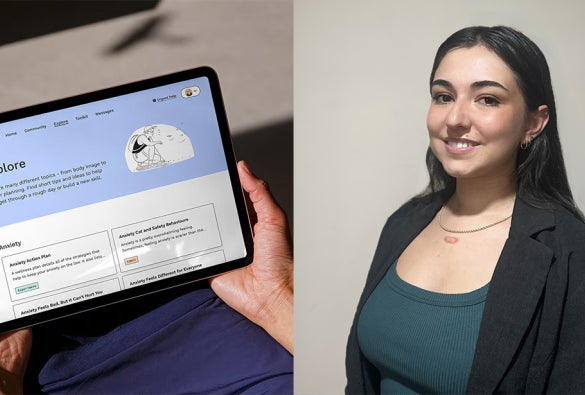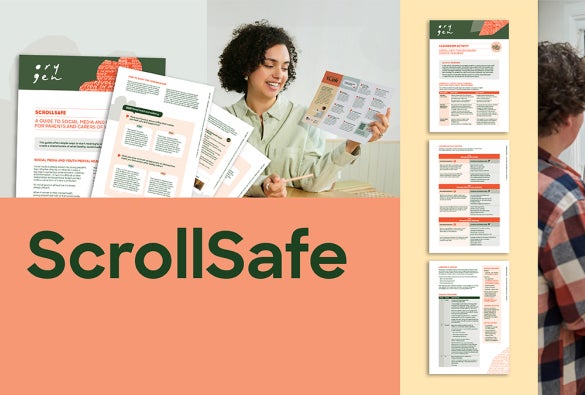Course information
View entry requirements, career options and what’s available to you, through our extensive student support network below.
Entry requirements
- Completed an AQF Level 7 Bachelor degree in a cognate discipline such as Health Science, Social Work, Psychology, Medicine, Counselling, Criminal Justice, Youth Work or Education OR
- Completed an AQF Level 7 Bachelor in any discipline and at least 2 years of approved work experience.
Career options
This graduate certificate will help you build a strong foundation in child and adolescent mental health so you can collaborate with them, their families, carers, educators and communities to deliver better mental health outcomes. You can apply your skills in evidence-based assessment and intervention approaches in child and adolescent mental health to a range of educational, therapeutic, community and clinical settings.
Upon completion, you can continue studying and gain your Master of Child and Adolescent Mental Health.
Student support
VU Online provides you with the support you need, when you need it, during your course. Our support network has a single focus on ensuring you are entirely supported to succeed in your studies.
Our highly experienced academics are responsive and accessible and understand how to deliver a quality online learning experience. You will also be introduced to your very own Student Success Advisor, who provides motivation and one-on-one personalised assistance with non-academic matters throughout your course.
You’ll experience the support of your community through chat, virtual seminars and discussion board activity. Remember, your support network is only a phone call and email away.
Fees and FEE-Help
Our Graduate Certificate in Child and Adolescent Mental Health costs $2,870 per unit*. The total cost for all 4 units is $11,480.
FEE-HELP loans are available to assist eligible full-fee paying students with the cost of a university course. This Government loan scheme helps to pay for all or part of their tuition.
*2026 student fees are shown and are subject to change.
Commonwealth Supported Places
A Commonwealth Supported Place (CSP) is a place where the government pays for part of your unit fees. This is a subsidy, not a loan, so you do not need to pay it back. Your remaining fees may also be eligible for FEE-HELP.
This subsidy is available to eligible students completing the Graduate Certificate in Child and Adolescent Mental Health. It is only applicable to new students commencing their Graduate Certificate in 2024. To find out if you’re eligible for this subsidy, visit the government’s Study Assist. Limited places available.
For more information on fees and student support, download a brochure.
How online study works
Studying with VU Online means that you can undertake postgraduate study without having to attend on-campus classes. This makes it easy to fit study around existing commitments including work and family. You will be able to access your coursework, resources, assignment details and individual feedback from facilitators, all from your online learning environment, VU Collaborate.
Chat with fellow students, compare research notes and collaborate on group tasks – it’s all possible with our seamless, community-focused platform.
With VU Online, you will study just one unit at a time under the award-winning VU Block Model®. Learn about our postgraduate online Block Model with this YouTube video.
You will receive support from our responsive academics and facilitators, as well as your dedicated Student Success Advisor throughout your study.
How to apply
VU Online has simplified the application process, involving just three key steps.
- Speak to one of our Student Enrolment Advisors, who will help you determine your eligibility for the program and whether it suits your career goals. Our advisor will keep you informed of all the application requirements and what to expect during the process. They can also suggest flexible study plans for your circumstances.
- Begin your online application and submit the required documentation. This may include a copy of your CV and academic transcript.
- Upon completing your application, you will receive a confirmation email or an email letting you know if you need to provide any additional information.
What you'll study
Introduction to Child and Adolescent Mental Health (Unit Code HNO6014)
This unit introduces students to the key principles and approaches of mental health and recovery-oriented services delivered to diverse children, adolescents, and their families. Learning focuses on presentations of mental ill-health in children and adolescents, who are experiencing challenging social and family environments. The unit examines a range of barriers and enablers to child and adolescent friendly mental health service provision. Students will reflect on strategies to provide culturally appropriate, family-focused, multidisciplinary, and intersectoral mental health services to children and adolescents.
Child and Adolescent Engagement and Assessment (Unit Code HNO6015)
This unit examines key principles, strategies, and approaches to engage with and assess diverse children and adolescents experiencing mental-ill health. Students interrogate how to conduct responsible, safe, and ethical risk assessments guided by relevant legislative frameworks. Learning includes a comprehensive analysis of child and adolescent-friendly models and approaches for successful clinical practice. Students also critically reflect on their interpersonal communication when conducting age-appropriate biopsychosocial, culturally appropriate risk assessments.
Effective Trauma-Informed Care (Unit Code HNO6012)
In this unit, students examine the experiences of trauma among people from diverse populations, cultures, and age groups and its impact across the lifespan. Students will analyse the way people, with the lived experience of trauma, report feeling stigmatised, discriminated against and misunderstood. These impacts include emotional dysregulation, substance misuse, self-harm, and suicidal behaviours. Students will also appraise the eight foundational principles of trauma-informed care and practice that focus on modelling interpersonal relationships, working with cultural differences, advocating for consumer control and choice, inspiring hope, supporting recovery, and integrating care. The unit requires students to critically reflect on their practice through a trauma-informed lens and interrogate the importance of recovery-oriented practice when caring for people who have experienced trauma.
Mental Health Foundations Unit Code (HNO6009)
In this unit, students focus on developing their understanding of mental ill-health. Students examine the most common mental illnesses; the factors that contribute to their prevalence; and the impact of mental illness on the lived experience of diverse people, families, and communities. Students also examine mental health as a national health priority, together with mental health promotion and illness prevention services and strategies. Other aspects of the unit include the legal and ethical frameworks that guide how practitioners work with people with mental illness; and the specific skills needed to build and maintain person-centred therapeutic relationships that promote recovery and resilience. Students will also critically reflect on the need for practitioners to self-care and the importance of consumer-centred supervision.
Student Support
VU Online provides you with the academic support you need, when you need it, throughout the course. With four layers of student support, our goal is to ensure you succeed in your studies. Our highly experienced academics understand how to deliver a quality online learning experience and are responsive and accessible.
You will also have access to a dedicated Student Success Advisor, who provides motivation and 1:1 personalised assistance with non-academic matters for the duration of the course. You will experience the support of a community through chat, virtual seminars and discussion board activity. Your support network is only a phone call or email away.
FEES and FEE-HELP
Our Graduate Certificate in Child and Adolescent Mental Health costs $2,600 per unit*. The total cost for all 4 units is $10,400.
FEE-HELP loans are available to assist eligible full-fee paying students with the cost of a university course. This Government loan scheme helps to pay for all or part of their tuition.
*2022 student fees are shown and are subject to change.
For more information on fees and student support, download a brochure.
Career outcomes
Ready to make a difference in the lives of children and adolescents? VU's online Graduate Certificate in Child and Adolescent Mental Health can help you achieve your goals.
Our program equips you with the expertise and practical skills to promote health and well-being for young people.
From developmental psychology and trauma-informed care to community engagement and mental health assessment, our curriculum covers a range of essential topics.
With a Graduate Certificate in Child and Adolescent Mental Health from VU, you can unlock new career opportunities and make a positive impact on future generations.
Download our program guide now to learn more.
Online study
This degree is offered through VU Online’s postgraduate Block Model, winner of consecutive LearnX Live! Awards.
Instead of taking two or three units a semester, you will study one unit at a time in six study periods per year. This offers you more flexibility than traditional on-campus degrees and the opportunity to immerse yourself in your study.
At VU Online, we take a personalised 1:1 approach to online learning, which makes learning with us highly interactive and supported.
Frequently asked questions
Is the Graduate Certificate in Child and Adolescent Mental Health accredited?
What can I do with a Graduate Certificate in Child and Adolescent Mental Health at VU Online?
Why do a Graduate Certificate in Child and Adolescent Mental Health from VU Online?
In addition, VU Online's postgraduate Block Model allows you to study one unit at a time so you can manage study alongside work and other commitments. You'll have access to support seven days a week and in the evenings, so you can achieve your goals.
What is the difference between the Graduate Certificate in Child and Adolescent Mental Health and Graduate Certificate in Mental Health at VU Online?
What is a Commonwealth Supported Place?
A Commonwealth Supported Place (CSP) is a place where the government subsidises part of a student’s unit fees. This is a subsidy, not a loan, so you do not need to pay it back. Your remaining fees may also be eligible for FEE-HELP.
This subsidy is available to eligible students completing the Graduate Certificate in Mental Health, Graduate Certificate in Mental Health Nursing, Graduate Certificate in Child and Adolescent Mental Health, Graduate Certificate in Nursing and Graduate Certificate in Public Health. It is only applicable to new, eligible students who enrol and commence their studies in 2024.
To find out more or check your eligibility, please speak with an Enrolment Advisor.










